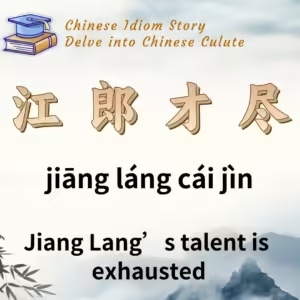
Chinese Idiom: 乘风破浪 (Cheng Feng Po Lang)
English Translation: Riding the Wind and Breaking the Waves
pīn yīn: chéng fēng pò làng
Idiom Meaning: This idiom describes ambitious aspirations and the courage to move forward, regardless of obstacles.
Historical Source: From Li Bai’s poem Xing Lu Nan (《行路难三首》), specifically the first of three.
Idiom Story:
Li Bai, one of China’s greatest poets, hailed from Longxi (modern-day Tianshui, Gansu). In his youth, he followed his father to Mianzhou and then to Meishan for his studies. Upon completing his education, he returned home, quickly gaining fame for his poetry in the region.
At sixteen, during the tenure of County Magistrate Yang Tianhui in Zhangming, local scholars recommended Li Bai for a minor official position in the county office. In May of the fifth year of Emperor Xuanzong’s reign (717 AD), the Fu River experienced a catastrophic flood, devastating many farmlands and homes along its banks. Rather than assisting the displaced victims, Magistrate Yang and his subordinates visited the riverbank to admire the floodwaters.
From a high bank, they witnessed the fierce currents carrying debris. Amid the chaos, a woman’s corpse was seen, trapped among the reeds, her lifeless face appearing almost serene. As fish leaped around her, Magistrate Yang, lacking any empathy, strolled along the riverbank, preoccupied with composing poetry. After a long pause, he managed to write four lines:
“Whose daughter floats by at sixteen?
Leaning against the reeds by the bank.
Birds gaze at her emerald eyebrows,
Fish play near her vermilion lips.”
However, he could not think of a concluding couplet. An old official, eager to curry favor, praised Yang’s poetic talent, suggesting that even ancient poets like Sima Xiangru and Cao Zhi would envy him.
Witnessing Yang’s indifference to the suffering around him, Li Bai felt compelled to speak out. He approached the magistrate and declared he could complete the poem. With a heart full of righteous anger, he recited his lines:
“Green hair follows the waves,
Red face is carried away by the tide.
Why must we encounter Wu Xiang?
Shouldn’t it be the resentment of Wu Yuan that drowns us in anger?”
Yang, enraged by Li Bai’s pointed criticism and insinuations about his character, angrily retorted, “Nonsense! Get out of here!” Fearing retaliation, Li Bai resigned and returned to his hometown.
Thus began Li Bai’s journey across the country, traveling through the Yellow River, Yangtze River, and other regions. He marveled at China’s majestic landscapes and gained insights into various social issues, fostering his political aspirations. His ultimate goal was to implement effective governance and restore peace, but by the late reign of Emperor Xuanzong, the Tang Dynasty was declining due to corruption and excess.
In the face of adversity, Li Bai continued to voice his critiques of the corrupt system, and in the third year of the Tianbao era, he was forced to leave Chang’an due to false accusations. During this tumultuous period, he penned Xing Lu Nan, criticizing the dark political climate while expressing his unwavering ambitions despite setbacks. The first six lines of the poem reflect his despair:
“Golden goblets of clear wine worth thousands,
Jade platters of exquisite delicacies worth ten thousand.
I pause my cup and chopsticks, unable to eat,
Drawing my sword, I gaze around, feeling lost.
To cross the Yellow River, ice fills the river,
To ascend the Taihang, the snow blocks the path.”
Yet, even amidst these challenges, Li Bai maintained hope, concluding with the famous lines:
“Life’s journey is hard! Indeed, it is hard!
With so many diverging paths, where can one go?
But I believe that one day,
We will ride the wind and break the waves,
Sailing straight with the cloud sails across the vast sea.”
The phrase “长风破浪” (long wind breaking waves) here translates to “乘风破浪” (riding the wind and breaking the waves), capturing the essence of striving toward lofty goals despite difficulties. This sentiment echoes an earlier statement from the Southern and Northern Dynasties period by General Zong Quan, who expressed a desire to “ride the long wind to break the waves across ten thousand miles.” Over time, this gave rise to the idiom, which now signifies the courage to face challenges head-on while pursuing one’s dreams.






